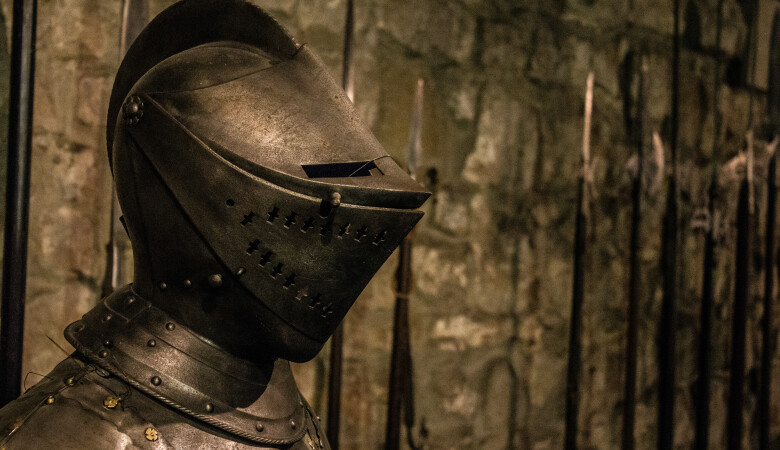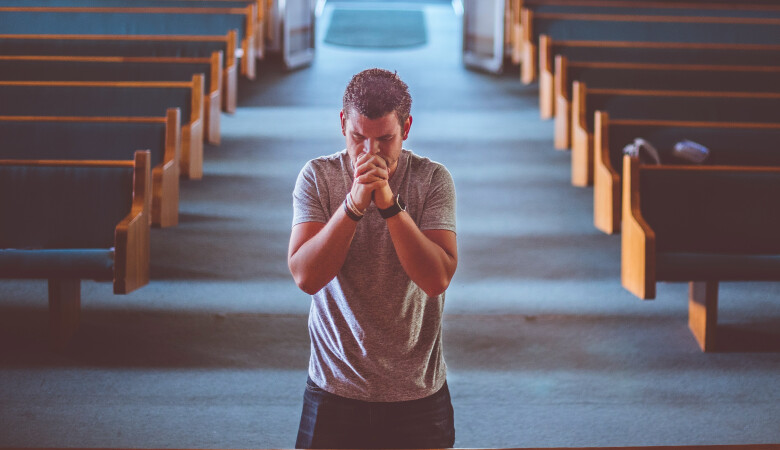Crucified with Christ, Alive in Christ (Galatians Sermon 5 of 26)
December 01, 2013 | Andy Davis
Galatians 2:20
Salvation, Fullness in Christ
Andy Davis preaches an expository sermon on Galatians 2:20. The main subject of the sermon is how the Christian lives by faith in the Son of God.
- Sermon transcript -
I just discovered that the battery is out in this pulpit clock, so you guys are at my mercy now. No, I've got the watch here, and we'll keep an eye on it. But I tell you, I could without any difficulty preach for hours on this one verse. It's an incredible verse, and I'm looking forward to it. One of my favorite short stories that I've read is a tragic but powerful story written by Hans Christian Anderson in 1845, called The Little Match Girl. It's a story of a little girl who is forced out into the cold by her cruel father to sell matches. She has a bundle of matches in her little hand, and she's walking through the streets of the city on New Year's Eve. And so, it's a festive time, a time of celebration for many wealthy people. She's not among them, and she's on the outside looking in. She goes and sees these incredible mansions, these houses and these windows, and she can see roast goose, and just can see the steam rising from it. And all of the incredible dishes that are laid out on these banquet tables, one window after the other, and she's out in the cold.
She's on the outside looking in, and how she yearns to be included. How she yearns to have a place at the table. She would love to be welcomed in, and to have someone beckon to an empty chair, and that she would be able to sit down. And with a sense of joy and welcome, to be able to partake in that feast. She would love that, but no one invites her in; she doesn't really expect it. She finds an alcove, a little sheltered place, it's windy, it's cold, a little snowy and miserable, and she gets a little bit of a break from the wind. And she looks down at the matches in her hand, and pulls them out one at a time and strikes the match, then lights it, and looks at its glow and looks at the fire, as it flames to life, and burns for a little while, then flickers and goes out. And as she looks, she imagines that she's involved in one of these feasts, that she's actually sitting at a table and eating, and then the match goes out then she pulls out the next match and she lights it, and it flares and flames for a little while. And she looks at the warmth and the light of it, and then it flickers and dies. And little by little, of course, she burns every match in her hand one at a time. And in the story, she ends up falling asleep out in the cold. And ultimately, it seems, dying out there.
And I think about that in terms of the gospel, I think about that in terms of people who are not yet Christians, people who are on the outside looking in. What do they have to live for? They have in their hand a bundle of matches that represent temporal pleasures, earthly pleasures that flare up, and bring light and heat, and some pleasure just for a little while, and then they flicker and they die out. And when the bundle of matches is gone, then life is over, you die. And the incredible joy that I have as a preacher of the gospel is to tell you that God is spreading a wedding banquet and he is inviting outsiders in. And no one starts on the inside, everyone is on the outside. And at some point by repentance and faith, if you believe the invitation that the King is giving, you can walk through the doors, and there will be a place for you. And you will have a chair, and you'll have a name placard right there, it's going to be your name, that chair was meant for you. We find out in the fullness of Bible teaching, from before the foundation of the world, God saved that place for you.
And isn't that a glorious story to tell the outsiders of this world? To give them a warm and rich invitation to come into the banquet feast through faith in Christ. Are you on the outside? Are you in the cold? Are you looking at matches flaring up and burning for a little while then dying, and then going from pleasure to pleasure to pleasure until, at last, you die in the cold? Don't do that, don't leave this room unconverted. Don't leave here on the outside, don't leave here in the cold. Jesus said in a rich welcome, "Come unto me all you who are weary and heavy-laden, all you who are out in the cold, come and I will give you rest. I will give you a feast, I will set a place for you, and you will sit there, and it's just for you." Now, this is the glory of the passage I get to preach on today. I get to talk about the individual aspect of salvation. The fact that it's personalized, the fact that it's for you individually, I get to talk about that today. Eastern mystical religions, Eastern religions like Buddhism and Hinduism, there's a sense of the ultimate denial of the significance of the individual, that when you die, you become like a drop in an endless sea, when you reach Nirvana, whatever you reach, complete emptiness, you become nothing.
God did not create you to end up nothing. He created you a person in the image of God, as he is a person. And that individuality he will uphold for all eternity. And he saves individuals through repentance and faith in Christ. And so I'm going to preach on that today, I'm going to talk about the individual aspects of salvation through this one verse, Galatians 2:20. And what an incredible verse it is, look at it again, you heard Ashoke read it.
"God did not create you to end up nothing. He created you a person in the image of God, as he is a person. And that individuality he will uphold for all eternity. And he saves individuals through repentance and faith in Christ."
I. Jesus Loved Me and Gave Himself for Me
In Galatians 2:20 it says, "I have been crucified with Christ, and I no longer live, but Christ lives in me and the life I live in the body I live by faith in the Son of God who loved me and gave Himself for me." Now, your outline there is probably one of the most creative outlines I've ever done. That's a complete joke. If you look at it, it's just the phrases of the verse broken up numbered and that's it. You think, "What does the pastor do all week? I mean, this is what you come up with? I could do that." Maybe you could, maybe you should, I don't know, but this is it, and even worse, I'm not even going to follow this order, that's even worse. I'm actually going to go to the end of the verse first, and I'm going to want to talk there. I'm going to take it more in redemptive historical chronological order than the order of the verse.
I'm going to start with Christ's love for you. I'm going to start with his love for you individually before the world began. We're going to start there, and we're going to travel through what he did for you before you were ever born, how he gave Himself for you. And then how in a mystical way through faith in Christ you became united with Christ, and you were crucified with Christ through your faith in Him. And we're going to talk about the significance of the next phrase, "I no longer live." And a lot of my ethical implications are going to be in that. I want you to learn what that means "I no longer live."
And we're going to talk about the power of the Christian life, "Christ lives in me," and go back and talk more about that in that phrase, "the life I now live in the body, I live by faith in the Son of God," so that's the ordering of the sermon. And we're going to go from that to the Lord's Supper which is a representation, an ordinance set up to remind us of that wedding banquet, that feast that we're going to have in the kingdom of heaven. It's a foretaste, it's meant only for Christians. And so if you have not repented and trusted in Christ, if you're not testified to that by water baptism, we're asking that you not partake, we want you to know that you're an outsider, but you don't have to leave this room genuinely, spiritually an outsider. And you can partake in the next one of these that we do if you just repent, believe, and testify to that by water baptism, we will love to have you at the next one. But it is a beautiful kind of integrated message that the Lord has for us today, a welcome at a banquet table. We don't have to be outside in the cold. We can sit at the table.
So let's start with the end of the verse. And just as we look at it, we see the individuality, the personal aspect of Christianity throughout the verse, look at the emphasis, "I have been crucified with Christ, and I no longer live, but Christ lives in me, and the life that I live in the body, I live by faith in the Son of God who loved me and gave Himself for me." So I want to zero in on that last phrase, "Who loved me and gave Himself for me." Talking about Jesus, this is talking about the Son of God, about Jesus. And do you realize how true it would be but how different it would be if he had just changed one word to this, "Who loved us and gave Himself for us." Isn't it true? And frankly aren't most of the verses in the New Testament written in the first person plural in that sense, “we,” “us,” that type of thing? You're going to find those verses commonly.
But this verse doesn't say that, true as it is. This verse focuses on Jesus's individual love for his sheep, for his people, how he loves us by name, how he calls on us by name. He knows us individually, and so the apostle Paul has put his name in there. Jesus the Son of God loved Paul, he died for Paul. And so we have Biblical warrant, we have a Biblical ground for seeing a very intensely personal love here from Jesus. And what I want to do is go back and establish that love Biblically as having happened before the foundation of the world. It's an eternal love that we are talking about here. He loved me before the world began.
I love Jeremiah 31:3 which says, "I have loved you with an everlasting love." Or you could say an eternal love, it's a timeless love. It's a love that wasn't connected at all to time. He is not bound by time, and so before he said, "Let there be light," before there were oceans, before there were rivers, before there was anything, Jesus loved you personally. And you wonder how could that even be. It's a mystery of omniscience, it's a mystery of timelessness, but it's true. He set his love on you before the world began. It's a timeless love, and it's an absolutely immeasurable love.
Take a minute and look at Ephesians 3:17-19, an immeasurable love. So it's just the next book over, Ephesians 3:17-19. And there Paul says, "I pray that you, being rooted and established in love, may have power, together with all the saints, to grasp how wide and long in high and deep is the love of Christ. And that you would know that love that surpasses knowledge so that you may be filled to the measure of all the fullness of God." What a great prayer that is.
Pray that for someone this afternoon. Pray that for yourself, but pray it for someone else. What is he praying for there in Ephesians? He wants them to have a kind of a supernatural power to grasp something. A supernatural power to understand something. Something that's beyond comprehension. He actually says that in that verse in Ephesians. That which is beyond comprehending that you would comprehend it in some way. And that you would, in your mind, by faith, roam through the universe and get a sense of the universe of Jesus's love for me. How wide it is, and how long it is, and how high it is, and how deep is the love of Christ for me. It's an immeasurable love. It's boundless. There is no limit to that love. And so it is a timeless love before the foundation of the world, and it will extend to beyond the end of the world. It will never change. And it is an immeasurable love. It's a particular love. He set his love on us. He loved me and gave himself for me. So look at that. And I'm done with Ephesians. But look at that in Galatians, how Paul says, "He loved me. He knows me by name."
And so in that, my mind goes to John chapter 10. Jesus is the Good Shepherd, and the Good Shepherd knows his sheep, and the sheep know him. And he calls his sheep by name. Isn't that a wonderful statement? Our Good Shepherd calls us by name. He knows our names. Sometimes he repeats them. Simon, Simon. Martha, Martha, that kind of thing. He says these things, and he calls on us by name. And it says there in John 10 that his sheep hear his voice and they follow him. And he knows them and he dies for them. He lays down his life for them.
And so we have right in our text in Galatians, it's a self-sacrificial love. This is a love in which he has laid down his life for you, “who loved me and gave himself for me.” It's far greater than saying he took a bullet for us. I feel like it's more like he took a lightning strike for us. I often picture that the wrath of God, the just wrath of God, is like a lightning strike. It's omnipotence plus omniscience, together pointing toward my destruction, my eternal destruction. It's the power of God and the mind of God focused like a laser beam on my destruction. That's what I deserve. That's what hell is. It's God attending to me negatively. And Jesus stepped into that white hot, blue hot stream of wrath and took it for me. For us, yes, but I want to stick with the verse, "He loved me and gave himself for me." And so this is the beauty of this incredible love that Jesus has for us. He stepped in and laid down his life under the wrath of God in a way that we can't even possibly begin to imagine.
You'll get a clearer picture on Judgment Day of what it was worth. Right now you can only know it by faith, you read the scriptures, you have a sense of the wrath, a sense of the lake of fire, a sense of eternity, but you really don't know. And we have a sense of the justice of God and a sense of the holiness of God, but we really don't know. But Jesus laid down his life for us. And he said in John, "Greater love has no one than this, that he lay down his life for his friends. You are my friends." He identifies us. "You're my sheep. I lay down my life." He gave himself for us. And so it's a transformative love as well. And that's the thing I love about this. He does. He loves us too much to leave us the way we are.
And so that brings me to the Ephesians 5 passage, which just talks about how husbands have to love their wives. But let's just look at it in terms of what it says about Jesus's love for us. Husbands should listen to this and say, "I want to be a better husband." But that's not why I'm going to Ephesians 5. I want you to listen as a redeemed son or daughter of the living God and say, "This is how Jesus loved me." "Husbands love your wives just as Christ loved the church and gave himself up for her, cleansing her by the washing with water through the word and to present her to himself as a radiant church without stain or wrinkle or any other blemish, but holy and blameless." That's what the love of Jesus at the cross does for you and me. It transforms us. It changes us entirely from being wretched, filthy, nasty sinners, to being pure in his sight. It's a transformative love. And all of this is focused on you. If you're a believer in Jesus, it's focused on you by name. He knows you individually. And you're like, "How can it be? How can it be that so great a Savior, a King, who is ruling the earth? He is the King of kings and Lord of lords. How could it be that he loves me? Little old me?"
And I just want you to be careful not to limit him and think he is too small to both rule heaven and earth and care about little old you. He's big enough to do both. And as a matter of fact, he does both. He loves you intensely and individually as if you were the only one he's thinking about right now. And yet he's thinking about a multitude from all over the world, greater than anyone could count. It's mind boggling. Sometimes it's good for us to picture that. I often think about the nations being gathered before Jesus and is he going to separate them as a shepherd separates his sheep from the goats. And I don't know how to picture it. How would you picture 10 billion people in one place?
Can you picture that? I don't even know what that looks like. What's the largest crowd you ever seen? Fifty, seventy-five, a hundred thousand, maybe two hundred thousand most. The earth starts to curve friends, buildings get in the way, trees get in the way, 200,000, that's it. How can we imagine 10 billion people? And then he separates them out in who knows what percentage, let's say 10% Christians. Okay? I don't have any idea. One billion Christians. Doesn't that make you feel special? There's a billion of us, a billion of us. That's a vast sea of humanity, a vast sea of them, and somehow Jesus loves you individually. Somehow He knows you. Somehow He knows when you're crying, when you're happy, when you're tempted. He is intensely interested in you and will be for all eternity. It's mind boggling, and that's why Ephesians says, "I pray that you would have power to grasp this." It's, "That you may be filled to the measure of all the fullness of God." It will stretch your mind, it'll stretch your heart to contemplate this. So, that's the kernel of the nut here, he loved me and gave himself for me. He died on the cross for me. He interposed his blood for me.
II. I Have Been Crucified With Christ, and I No Longer Live
Now, let's go back to the beginning of the verse. Paul entered at this moment. "I have been crucified with Christ." What does that mean? When Paul repented and believed in Jesus in some mystical way, in some mysterious way, he became spiritually one with Jesus. And so Jesus' death became his death, and Jesus' resurrection and his life became his life. And so in some mind boggling way, Paul can say, "I have been crucified with Christ." Now, what we want to do here is understand the once for all aspect of this. He's not continually being crucified with Christ. That's not what he's talking about here. I know there are verses that talk about denying yourself and taking up your cross, and that's important, but that's not what he's talking about here. This is the one for all aspect. When I repented and believed, when I trusted in Jesus, I was at that moment crucified with Christ, dead. What does he mean? What he means is that every single human being on the face of the earth is descended from Adam and born in Adam, we die under Adam's death penalty. We deserve to die, every single human being. We are born in Adam.
And then as we grow, as we get older, as we start to understand the world, as we start to understand that there is a Creator, and more if we have the opportunity, we understand God's laws and understand his standards, we sin, we violate those laws. So, what led to Paul dying is in verse 19, he said, "Through the law I die to the law that I might live for God." So, the law killed him. He realized, he became aware, that he had violated the law. The commandment came (he explains in Romans 7:9), and sin rose up to meet the challenge of the commandment and violated the commandment and he died. And he realized he deserved the death penalty. Now, sinners die apart from Christ all the time. They go to hell. But here, by faith, we realized, "Okay, I was crucified mystically, spiritually with Jesus. His death became my death." And so the person that Paul was in Adam died forever. That old man, that old person died.
It's a positional thing. God saw him in Adam until that moment, the Damascus Road. And at that moment, when he repented and believed, he moved over, and God saw him in Christ. Isn't that beautiful? And so this whole thing is taught in Romans 6, you can look there later, but he says there in Romans 6, "What then? Shall we go on sinning so that grace may increase? May it never be! We died to sin." We died, not "We are dying." We died to sin. How can we live in it any longer? "Or don't you know that all of us who are baptized into Christ Jesus were baptized into his death?" It's teaching the same thing. We were united with Christ by faith in death and it's punctiliar, it's a once for all, that's it. If you are a Christian, you died. The person you were in Adam is dead. And you don't need to make any effort toward that, you don't have to kill the old man or any of that. People get confused about those things. No, no, if you're a Christian, that person you were in Adam is dead.
Now, you have habit patterns, the body of sin must be done away with. But that person, you died. I have been crucified with Christ once for all. And then he says, "And I no longer live." Now, you're like, "Well, didn't he just say that?" No, this is different now. I think what happens here is this is what you have to say to yourself. Again, later in Roman 6, "Consider yourselves dead to sin but alive to God." There's an ongoing thing you need to say. You need to say to yourself all the time, "I no longer live. I no longer live." What does that mean? Doesn't mean that you don't have a life in the body. The next verse says, "The life I now live in the body, etcetera," so we do have a life in the body. What does it mean? Well, I think clarity for me comes in 2 Corinthians 5:14-15, listen to this verse. There it says, "For Christ's love compels us, or constrains us, because we're convinced that one died for all and therefore all died, and He died for all that those who live should no longer live for themselves but for him who died for them." That's what I think Paul means in Galatians 2:20, "I don't live for myself anymore."
Now, I think non Christians, they get up, and every day they ask this one question, "What do I want to do today?" What do I want to do today? Paul saying, "I don't ask that anymore." I don't. I don't ask that question. He says in Acts 20, "I consider my life worth nothing to me, if only I may finish the race and complete the task the Lord Jesus has given me, the task of testifying of the gospel of God's grace." "I don't live for myself anymore." And you have to learn to put those two together. Once for all I died... Forever died in Adam... That's dead... Dead to sin. Now I'm saying I no longer live. So, I don't get up in the morning and say, "What do I want to do today?" This is really hard for us. I think we may be culturally and just, where we are in history, it may be the hardest for us to say this of any people that has ever lived. We are choice-aholics. Do you know what I'm talking about? We are choice-aholics. Have you folks seen those new Coca-Cola vending machines that mix, you know, like, the fountain drink? You know what I'm talking about, I've seen them at Five Guys and Mo's. You know what I'm talking about? It's got an old-timey look, but it's not old-timey because it's got a touch screen on it, and you put a glass in or a cup, and then you get some choices. Have you ever been behind someone who's never used the machine before?
Not only are they learning how to use the machine, they are paralyzed by choice. They don't know what they want, they could mix some, a little of this, a little lemon, a little Cherry Coke, you could do... I mean, it's amazing what you can do. And the line is getting longer and longer behind that paralyzed individual. But there it is, we've got choice. And there's companies just giving us choices because that's what we want. We want to say every day, "What do I want to do?" That's the life in Adam, that's the essence of it. That's what Adam descendant people do. Everyday they say, "What do I want to to do?" Paul says, "I don't ask that anymore. I ask simply, what does Christ want me to do? How can I live for Jesus? And secondarily, related to that, how can I live for others?" Do you realize what an incredible benefit it is to be in this church and to have godly people who are living out faith in front of us, and we can learn from them?
"We want to say every day, "What do I want to do?" That's the life in Adam, that's the essence of it. ... Paul says, "I don't ask that anymore. I ask simply, what does Christ want me to do? How can I live for Jesus?"
I've had the benefit of just being close to Larry and Alana Parrish as they've cared for Andy. And many of you know that situation, some of you don't. Coming on a year and a half ago now, Andy was hit by a car, severe brain trauma, and it began, I would say one of the most challenging trials I've ever seen in my life. In some ways, you could say, it'd be easier for them if he had died in the road that day... Which Larry thought would happen and could have happened, the car was going 40 miles an hour. But God chose a different level of trial for them. And so I go over frequently on Thursday afternoons, and I've watched them caring for Andy, and it's just amazing. I'm just being discipled as I watch them. I was working on this sermon, and I was thinking about this phrase, "I know longer live." Larry and Alana don't get up saying, "What do I want to do today?" They just don't. They know what they're going to do today. They know what they're going to do. They're going to take care of Andy, and they're going to walk with Jesus doing it. That's what they're going to do. And both of them said at different times to me, individually, how he's worth it, Andy's worth it. And they said it so sweetly.
And it made me ashamed to think, "It would have been easier for them if... I just stopped thinking that. They don't think that way, they just are so delighted he's still alive. And the care level is just beyond imagination, it's just relentless. There's something they have to do every four hours without fail. I said, "What do you do at night, do you have to do it at night?" "Oh, yeah." But they don't, they have someone that they come in and hire, you know, at night. But occasionally that individual can't make it. And if they can't get someone to fill it, they do it. And so they stay up through the night and do that thing at midnight and four and whenever the schedule is and they do that. And I've learned about that, I learned what, "I know longer live," looks like. They haven't been to their beautiful lake house in a long time. They don't think, "When are we going to go to the lake?" They don't wonder about that. Day after day. Now, they would say that they're not perfect, none of us are. So, this is a hard thing to do, to say, "I know longer live." But I want to live like that, and I need examples like that and others who are going through sufferings or others, not just them, that are going through similar things. And there's a value to us to see it with your own eyes and to learn how to say it.
III. Christ Lives in Me
So, I commend that to you. I commend that saying. Learn how to say, "I know longer live, I'm not living for myself today. I'm not asking, what do I want to do today?" But it says, "Christ lives in me." And here's the power for the Christian life. Here's the mystery of the Christian life. It's just beyond imagination that we could even understand this. It says in John 14:23, "If anyone obeys my commandments, my Father will come and dwell with him, and we will live with him." He says, "We," including himself. So the Father and the Son... In John 14:23, "We will dwell with him." And a few verses later he says, "I will pray and ask the Father... And he will send the counselor or the Holy Spirit, who will live in you and be in you." And so in some mysterious way, we have God the Father, God the Son, and God the Holy Spirit dwelling within us. Christ lives in me. And that gives me the power to say, "I no longer live." I have a whole different kind of life that I'm living now. Christ lives in me. It's a mystery. Can only be accepted by faith, but by the power of the Holy Spirit we are enabled to walk in newness of life. And so that whole life is described. The life I live in the body now, I live by faith in the Son of God. I live every day by faith.
IV. The Life I Live in the Body I Live by Faith in the Son of God
And Paul's going to make it very plain, and this is a hard thing to understand. There is a labor to the Christian life. There's hard work in the Christian life. It's hard to be a Christian. We're fighting the good fight of faith, we're laying aside every weight, and running with endurance this race marked in front of us, but we're doing it all by faith not by effort, if you know what I'm saying. Having begun by the spirit, we are not perfected by the flesh. So the way I put all that together is, moment by moment, I'm saying Christ lives in me. By faith in Christ, I will do this. I'm relying on Jesus at every moment. I'm thinking Christ in me at every moment. I want to speak the words of Christ. I want to think the thoughts of Christ. I want to serve as Christ did. As a matter of fact, Paul says in Philippians, "All I want is to know Christ and the fellowship of sharing in his sufferings, becoming like him in his death, and so somehow to attain to the resurrection from the dead." This is the Christian life, moment by moment, this life that we live in the body. And it won't be long, dear friends, won't be long. Life is a mist, we are a vapor. It appears for a little while, and then it just vanishes, gone. And so this life you live in the body, you just live this way a very short amount of time, and you'll have eternity in Christ to worship him and praise him. But now, you know what you get to do now, you get to suffer now, and you get to have faith now and trust in him now, and you get to serve him now where others are suffering. That you get to do. You don't do any of those things in heaven, but you get to do that now. And you get to battle temptation now, and you get to live this life in the body by faith in the Son of God.
"We're fighting the good fight of faith, we're laying aside every weight, and running with endurance this race marked in front of us, but we're doing it all by faith not by effort. ... Having begun by the spirit, we are not perfected by the flesh."
V. Application
So what applications can we take from this? First and foremost, don't stay outside in the cold. Come into the feast, come into the feast. And I'm not referring to the Lord's Supper. I've already spoken about that. That's just a symbol, a very important symbol, but it's just a symbol. I'm asking you to come into the real feast through faith in Christ to know that your sins are forgiven, that God loves you, that Jesus loves you, he died for you, that you're going to heaven when you die. Just the sweetness of fellowship with that. And having come in, know all of these things. This is the feast. You get to have a banquet every day through the faith you have in the Son of God. By reading scripture, you can feast on your salvation day after day.
Then if you're a believer in Christ, come to faith in Christ, just learn how to live for him and for others and not for yourself. Learn how to be suspicious of the instinct you have to say, "What do I want to do today?" or "What's best for me in this situation? What are my preferences?" Live for others, live for the glory of God. And as we come to the Lord's Supper, understand what these tokens represent. They represent looking back. They represent the death of Christ, who loved you and gave himself for you. They represent each of you who is going to partake. You're going to take your own piece, and you're going to put it in your own mouth, and you're going to chew it and swallow it. That was your portion. It represents the individuality of your salvation here. And you get to take your own cup and drink it. It represents you partaking in Jesus. And it represents that incredible day that's coming soon when you will sit at the table with Abraham, Isaac and Jacob in the Kingdom of heaven, and you will feast, and you will see Jesus, and you'll have the chance, along with maybe a billion other people, to tell him thank you for dying on the cross for you. Close with me in prayer.
Father, we thank you for the truths of this one verse. Rich, full truths. We thank you, O Lord, that You, Jesus, set Your love on us before the world began, and that love is an everlasting love, a transforming love, and it's an individualized love. You know us by name and call us by name. And now as we partake in the Lord's Supper, we pray that You would pour forth Your Holy Spirit on us and strengthen us, O Lord, to partake of this in a worthy manner. Understanding our sinfulness, yes, but how completely covered our sins are through the blood of Christ, and looking forward by faith to the day when we will feast with You in the kingdom. In Jesus' name, amen.



























